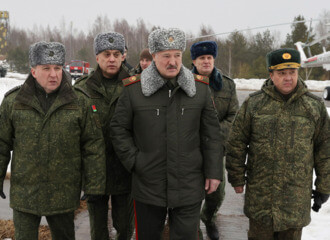На русском языке:
Нетерпимость к евреям и набеги на богослужения – отчет США о нарушениях свободы вероисповедания в Беларуси
На беларускай мове:
Нецярпімасць да яўрэяў і набегі на богаслужэнні — справаздача ЗША пра парушэнні свабоды веравызнання ў Беларусі
United States Commission on International Religious Freedom (USCIRF) published a report on Belarus, which states that the Lukashenka regime conducted ‘clean-ups’ against Catholics and Orthodox Christians who criticized its authoritarian tactics, raided Catholic and Protestant services and publicly propagandized anti-Semitic conspiracies and rhetoric.
The authors of the report note that the authorities clearly perceived a link between protestors and religion. In their opinion, it’s evidenced by reports of police beating cross-shaped bruises on the backs of protestors or forcing detainees to pray during torture. Both Catholic and Orthodox prisoners reportedly have been denied visits from clergy and refused access to religious materials. The Catholic Church actively supported opposition to the Lukashenko regime even prior to the elections.
The government understates the level of religiosity in the country, claiming that only 60 percent of the country is religious. But independent polling by the Pew Research Center demonstrated higher levels of religiosity, with only 3 percent of respondents claiming to be atheist or non-observant, stated in the report.
The Belarusian government still maintains ownership of the “Red Church,” and the congregation must pay more than 5.000 USD per month to rent the building. In July 2020, prior to the unrest, the government informed the congregation that it owed an additional 166.000 rubles (roughly 68.000 USD) for renovations it did not request. By January 2021, the government declared that the debt had now risen to 350.000 rubles (or roughly 140.000 USD).
The Church’s chief accountant reported that the government is unwilling to speak with them about it and that the congregation feels as if the regime has declared "war" on them. "We do not know what they want from us",– the chief accountant stated.
According to the authors, antisemitic sentiments are also common among authorities in Belarus, which had one of the largest Jewish populations in Europe prior to the Holocaust. On July 3, Lukashenka spoke of a «Holocaust of the Belarusian people» during World War II that is largely ignored because the «Jews succeeded in causing the entire world to kneel to them».
In August 2020, as the anti-government protests commenced, law enforcement abducted a young Israeli tourist visiting his extended family in Belarus as part of a historical roots tour and tortured him in custody. When the police found out he was Israeli, they berated him with antisemitic insults and threatened to give him «another circumcision».
On September 28, 2021, Belarusian security services shot and killed a young political dissident named Andrei Zeltser during a raid on his apartment in Minsk. After a Russian outlet claimed Zeltser was Jewish, Belarusian state television aired an antisemitic diatribe in which the commentator spoke in a mock Jewish accent and called Zeltser a «cosmopolitan, enjoying state benefits to fatten himself up and live in two countries, to make money here and spend it there».
In the conclusion of the report, it is stated that there’s a possibility Belarus and Russia will continue to grow closer, with Lukashenka sacrificing his cherished independence from Moscow to remain in power. According to the authors of the report, this does not bode well for religious freedom in Belarus, which will only decline as Russian influence rises. Repression against Belarusian civil society has dramatically impacted religious groups across the spectrum, including even the largest group, the Belarusian Orthodox Church. As U.S. policymakers seek to address major human rights violations in Belarus, they should recognize how the Belarusian government is using severe religious persecution as a strategy of repression against its citizens and incorporate this understanding into U.S. policy toward the country.


